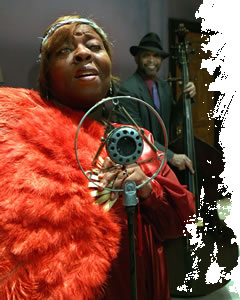
Ma Rainey's Black Bottom @ Beck Center
 Playing at the Beck Center for the Arts, in Lakewood starting Friday January 30, Ma Rainey's Black Bottom is a play by the late, great August Wilson. This powerful theater experience is not afraid to be as funny and lyrical as it is angry. In the play, Gertrude Malissa Nix Pridgett Rainey, better knownn as Chicago blues legend "Ma" Rainey sets out to record her latest album. The scene is in Chicago in the 1920s, and Ma Rainey and her band are facing the historic exploitation of black recording artists by white producers. Generational and racial tensions escalate among Ma Rainey's band and producers.
Playing at the Beck Center for the Arts, in Lakewood starting Friday January 30, Ma Rainey's Black Bottom is a play by the late, great August Wilson. This powerful theater experience is not afraid to be as funny and lyrical as it is angry. In the play, Gertrude Malissa Nix Pridgett Rainey, better knownn as Chicago blues legend "Ma" Rainey sets out to record her latest album. The scene is in Chicago in the 1920s, and Ma Rainey and her band are facing the historic exploitation of black recording artists by white producers. Generational and racial tensions escalate among Ma Rainey's band and producers.One of the first black singers to get a recording contract, Rainey has become a diva -- a temperamental star -- and a woman to be reckoned with. In 1923 with Moonshine Blues, Paramount billed her as the "Mother of the Blues." There's good evidence that she did name the style of music "the blues," which she molded out of the improvised music and sung speech vocal inflections known as "bluing the voice."
The play is set in 1927, near the height of Raineyís success. This is the story of a night in a Chicago recording studio as Rainey, her entourage, and her band members smoke, joke, talk, and fight about the music they play, the music they want to play, and the road theyíve travelled, from church socials and whorehouses in places that are not even small time, all the way to Chicago.
The commercial forces that have made these musicians successful, that have promised them escape, are the same forces that make harsh demands and warp their lives. Every character in Wilsonís plays want to sing his or her own song, if only metaphorically. Ma Rainey wrote and popularized many standard blues songs, pioneered recording black music, and invented her own stage devices and shows out of the revival tradition. Sheís a powerful, successful woman who says:
"White folks donít understand about the blues. They hear it come out, but they donít understand how it got there. They donít understand that Ďs lifeís way of talking. You donít sing to feel better. You sing Ďcause thatís a way of understanding life."
The Beck honors this year's passing of August Wilson and the 25th anniversary of the Broadway production. Performances run through late February. Schedule and ticket information is available at http://www.beckcenter.org.
From Cool Cleveland contributor Marcus Bales marcusATdesignerglass.com
(:divend:)